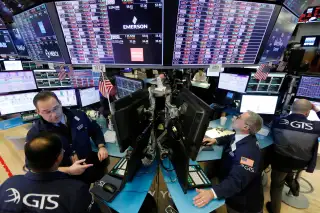Why the Improving Economy Is Actually Hurting the Stock Market

With the U.S. vaccine effort finally hitting its stride, Americans are growing more and optimistic about the economy. And the stock market is...unhappy?
On Friday, the U.S. reported nearly 380,000 new jobs and a declining unemployment rate, as the increasing pace of vaccinations allows more and more of the economy to re-open. While stocks were up slightly on the news, most of Wall Street has been talking about the fact that the S&P 500 is down more than 3% from its mid-February peak, while the Nasdaq is down nearly 10%.
It’s counterintuitive, as market logic often is, but there is a logic here. Just as the stock market looked past the public-health and economic devastation of 2020 and focused on the likelihood of a vaccine-induced boom, it’s now looking past the boom and focusing on the twin threats of rising interest rates and inflation.
When Treasury bond yields shoot up, as they have recently, the spike can hurt the stock market for two reasons. First, it causes a sudden increase in borrowing costs for consumers and corporations, because interest rates on many bank loans are pegged to yield of the 10-year Treasury note, which has been rising sharply in the past two weeks. That’s why, for instance, the average 30-year mortgage rates just topped 3% for the first time since the summer, something that could slow home sales.
Second, stock investors have to worry about the underlying cause of the rapid move in yields, which is the bond market preempting a jump in consumer prices. When there’s a sudden increase in demand for goods and services, it inevitably causes prices to rise. In the long run, most companies will adjust. But in the short run it can put them in a bind because prices for raw materials — things like steel and oil — often jump faster than corporations can hike the prices shoppers pay for finished goods at the store.
And recently the demand increase in the U.S. has been explosive. The Atlanta Federal Reserve’s “GDPNow” statistical tool for estimating gross-domestic product growth currently estimates that first-quarter growth in the U.S. will hit a staggering 10%. When consumer prices rise rapidly, the Federal Reserve must raise its benchmark interest rates to rein them in.
The upshot is that the stock market does best during “Goldilocks” periods, when the economy is hot, but not so hot that it stokes inflation and forces the Fed’s hand. But right now, the bond market is sending a clear message: the economy is so hot it’s in danger of overheating.
Little room for error
Of course, economic growth will also ultimately boost corporate profits, the key factor in determining stock prices. The problem for the stock market right now is that many investors already started betting on that growth months ago, bidding up shares and "pricing in" a best-case scenario.
In fact, the stock rally that began almost exactly a year ago, on March 9, 2020, has seen the broad Standard & Poor’s 500 appreciate by 75%. The aggregate price of the 500 stocks in the index was recently 35 times the previous 12 months earnings, a near record high, according to Yardeni Research.
Until the inflation alarm signals stop sounding from the Treasury market, expect more counterintuitive stock-market events like that Friday morning.
More from MONEY:
The New Investor's Survival Guide: How to Make Money (and Stay Sane!) in Today's Wild Markets
How Much Should You Pay a Financial Advisor?
Investors Are Betting Their Retirements on Bitcoin. And, Yes, That Is Very Risky